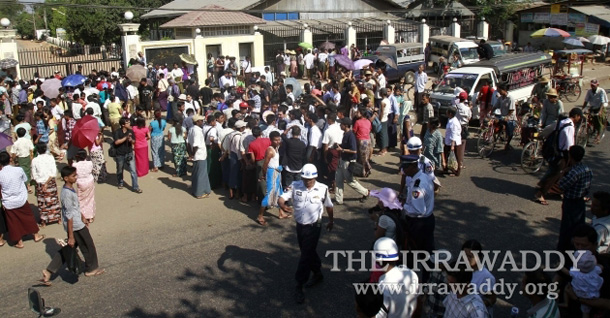WASHINGTON—Highly appreciative of recent reform steps taken by the Burmese government including the release of political prisoners, a top US official says that the country has a long way to go on human rights issues and also must make a commitment to continuing with democratization.
Assistant Secretary of State for Democracy, Human Rights and Labor Michael Posner, who led a group of nearly two dozen officials for the first ever US-Burma Human Rights Dialogue last week, said Washington wants to help with the reform process as much as possible. Based on his interaction with Burmese officials, he expressed hope that Burma would continue down the road of political and social reform.
“The US-Burma Human Rights Dialogue was an open, direct and honest discussion of differences and areas where the two countries can work together,” Posner told a group of State Department reporters in a conference call upon his return from Burma. “I thought it was a constructive set of discussions.”
Meetings covered a range of topics including a session on economic revival and another on military issues. There was one session focusing on civilian security in ethnic areas by the nation’s borders, while another dealt with criminal justice, prison issues and the rights of prisoners. National League of Democracy (NLD) Chairwoman Aung San Suu Kyi attended the final session which focused on the rule of law.
Posner said the presence of top Defense Department officials—Vikram Singh, deputy assistant secretary of defense for East Asia, and Lt-Gen Francis Wiercinski, the head of the US Army’s Pacific Command—helped his delegation present its human rights perspectives and concerns.
Singh and Wiercinski discussed ways the US military deals with counterinsurgency. They also briefed their Burmese counterparts on the counterinsurgency manual of the Pentagon, in addition to the issue of accountability and the different countries that the US has helped tackle the issue of child soldiers.
Noting that the US military officials helped enforce the human rights nature of the meetings, Posner asserted that there was no discussion of military-to-military engagement beyond the human rights agenda.
Posner said that both sides frankly discussed humanitarian concerns and his delegation also brought up the burning questions of the Kachin conflict and child soldiers. “We had an open discussion,” he said, adding that the Obama administration now wants to see greater access to border areas by various international groups.
“We want to see various international agencies and organizations involved, have a presence and greater confidence,” he said. “We hope to see a final ceasefire with Kachin and the beginning of a negotiation for a long-term peace.”
This is the first time that Burma is having such a dialogue with any country, he said, adding that there would be the prospect of similar exercises on a more regular basis.
Remaining political prisoners was one of the major issues that came up during discussions. According to US figures, the Thein Sein administration has released more than 700 people identified as political prisoners in six amnesties. The US has a list of several hundred more, which the delegation resubmitted to Naypyidaw officials including the Ministry of Home Affairs.
In the list submitted by Posner, the US believes there is a significant number of people that should be immediately released, such as those charged with violent crimes in areas fraught by ethnic conflicts.
“We hope they set up a mechanism to evaluate these cases on a formal, ongoing basis,” added Posner. “This is a discussion we have been having over the last 18 months with them on a regular basis. We hope that this discussion continues.”

















